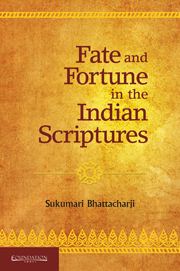Book contents
- Frontmatter
- Contents
- Preface
- Introduction
- Chapter 1 Inception
- Chapter 2 Rebirth and Transmigration
- Chapter 3 Karman and its Consequences
- Chapter 4 Karman, Fate and Free Will
- Chapter 5 Fate, Eschatology and Liberation
- Chapter 6 Premonitions and Presages
- Chapter 7 Deflection: Remedial Measures
- Chapter 8 Vicarious Deflection
- Chapter 9 Fate and Human Endeavour
- Bibliography
- Index
Introduction
Published online by Cambridge University Press: 05 October 2014
- Frontmatter
- Contents
- Preface
- Introduction
- Chapter 1 Inception
- Chapter 2 Rebirth and Transmigration
- Chapter 3 Karman and its Consequences
- Chapter 4 Karman, Fate and Free Will
- Chapter 5 Fate, Eschatology and Liberation
- Chapter 6 Premonitions and Presages
- Chapter 7 Deflection: Remedial Measures
- Chapter 8 Vicarious Deflection
- Chapter 9 Fate and Human Endeavour
- Bibliography
- Index
Summary
FATALISM, the belief that fate is an unseen, incalculable and uncontrollable power which controls human affairs, is ubiquitous and a very old belief. In Vedic times, says Klostermeier, “It was apparently a fairly marginal existence which was possible under the given circumstances; survival was precarious and threatened by famine, disease, enemy and wild animals. Every catastrophe was necessarily attributed to a break in the powercircuit that connected the devas with the world of men.” Yet in India, the earliest texts, known as the early Vedic literature, the Sarphitās and Brāhman, do not have any trace of fatalism. Life was more exposed to dangers and unforeseen calamities of nature than it was half a millennium later, but the tone that pervades this literature is that the Gods in heaven control human life and man can always placate them with laudatory, hymns, delicious oblations and libations in sacrifices. Generally, the Gods were benign and well-meaning, life was very much worth living as long as possible, nature was beautiful and bountiful and life was a joyous affair. Slowly but steadily with the inflow of plenty in agricultural production, cattle tending, resumption of maritime trade via the Middle East to the Graceo-Roman world, wealth increased. “The total complex indicates that the people of the PGW culture at the site had developed iron technology from the very beginning. They were also able to mine iron ore in a considerable quantity which enabled them to produce tools and implements in abundance.
- Type
- Chapter
- Information
- Fate and Fortune in the Indian Scriptures , pp. 1 - 21Publisher: Foundation BooksPrint publication year: 2014



